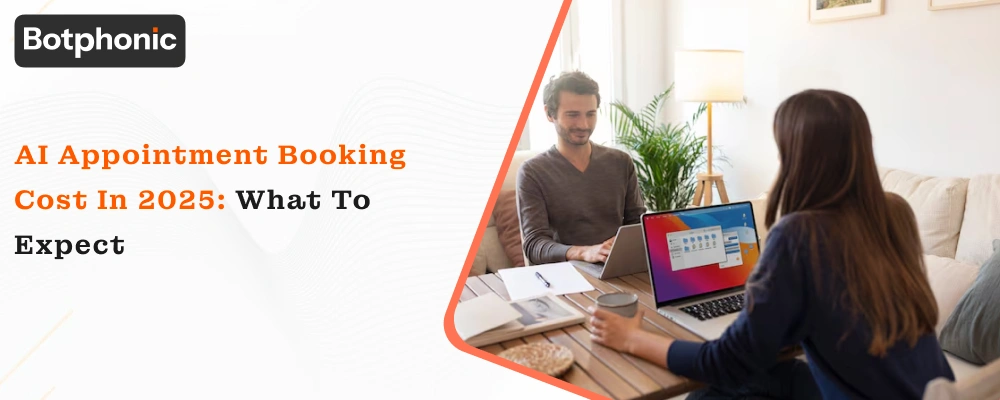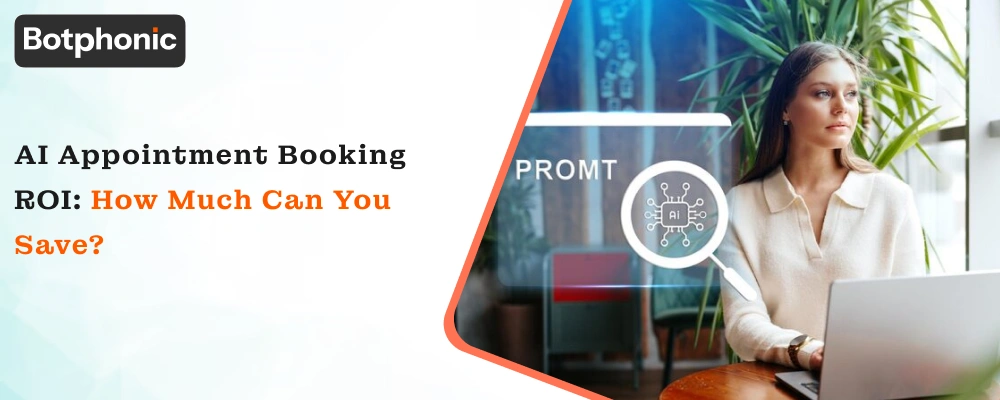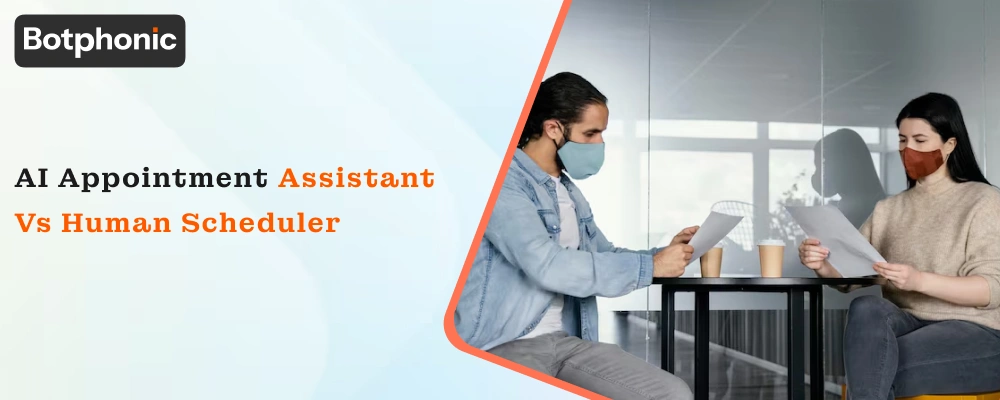
Summarize Content With:
Quick Summary
In the past, the process of booking an appointment was manual, slow, and dependent on human availability. If we move ahead to 2025, AI appointment helpers have established the bar for efficiency again. Technology is making booking hassle-free all across varied sectors, car services, hospitals, maintenance, and more, from AI call assistants to AI virtual receptionists.
AI has taken over the booking of appointments, where humans had the advantage through empathy and adaptability. The studies indicate that AI systems do three times more bookings at the same time and that the costs are down by 40–60%; still, the human touch in the emotional and trust-driven interactions is acknowledged as priceless.
The emerging phenomenon? It’s not AI vs Human but AI + Human. Companies are now combining the automation process with emotional intelligence, letting AI do the repetitive tasks and the humans provide the customers with the service that is relationship-driven. This partnership sets the new customer experience standard, speedy, error-free, and still human in essence.
Introduction
Remember when booking an appointment was a huge task. Many times it meant waiting on hold, scribbling notes, and even praying that the receptionist isn’t double booking. But to your wonder, these days are long lost. Even modern consumers expect speed and convenience along with accuracy. And here, artificial intelligence has been delivering this without any manual effort.
In 2025, AI appointment booking will not just be an abstract concept, but they will be enhancing operational efficiency and outperforming traditional human scheduling. Businesses from car services to home repair firms are now putting points in a critical decision. AI appointment assistant vs human, who can assist better in delivering a better customer experience?
Let’s get into this and separate this hype from reality, and dissect how these voice-driven AI booking platforms are revolutionizing how the world is scheduling its appointments.
Evolution of Appointment Booking: What is an Appointment Assistant?
The way appointment scheduling has transformed over the last few decades has made significant changes in history. From using paper planners and manual phone calls to digital calendars and AI-powered systems, businesses are adapting new methods with every generation. Shouting faster, accurate, and scalable solutions has made bookings way easier.
The Shift from Human to AI Scheduling
- Manual Scheduling: Usually managed by a receptionist or administrative staff. Human oversight has brought empathy and adaptability, but with limited hours, errors, and high costs.
- Digital Calendars: Implementing tools like Google Calendar helped automate reminders, but it still required human intervention to avoid conflicts.
- AI Appointment Booking Systems: These days, AI voice agents and virtual receptionists are handling appointment schedules autonomously. They even help confirm appointments and manage rescheduling. Moreover, it helps send reminders and interact with clients in multiple languages, while reducing errors and freeing human staff.
What is an AI Appointment Assistant?
An AI appointment assistant is a virtual scheduling system that is powered by artificial intelligence. It can easily:
- Understand natural language using voice or chat as a medium.
- Manage appointments, cancellations, and rescheduling automatically.
- Integrates with CRMs, calendars, and booking platforms as well, for making the workflow seamless.
- Offer multilingual support, which makes it ideal for a global customer base.
- Analyzes patterns to predict the optimal booking times.
To make it simple, let’s just say the evolution of appointment booking reflects a larger shift of business methods. It has highlighted the shift from human dependency to enhanced AI efficiency. While humans are bringing empathy in the customer relationship, AI brings precision, consistency, and scalability. It offers a balance that defines the next era of customer interaction.
The Human Touch: Traditional Appointment Scheduling
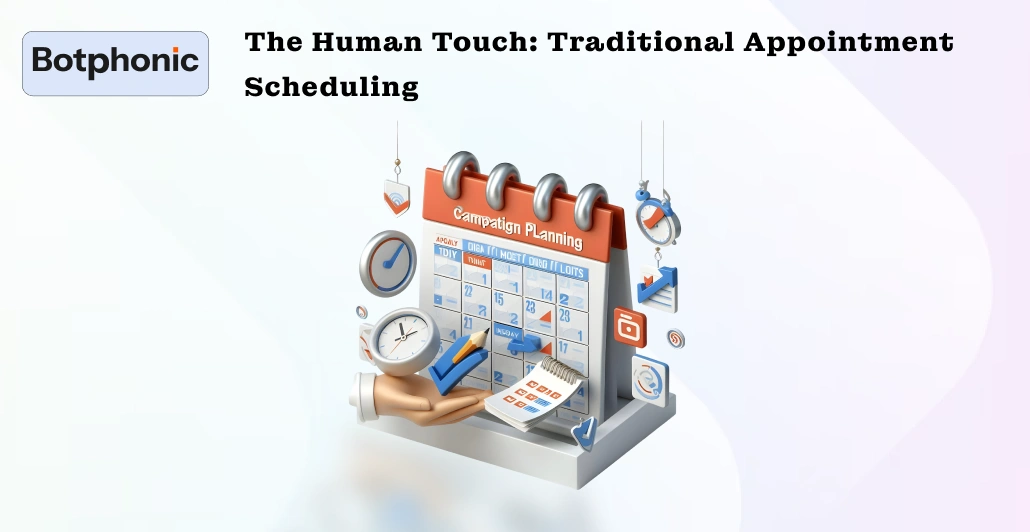
Before the algorithm was introduced to manage calendars and make chatbots to take calls, appointment scheduling was ruled by human receptionists. The process included a receptionist, a ringing phone call, and a notepad or just an Excel sheet. This was all required to make the business organized. It was really personal, reliable, and limited.
For a decade, this model worked. Whether it was about booking a haircut, a dental checkup, or there was an oil change required for your car, people used to value personal connection. It was effectively used to turn a routine call into brand loyalty. But as businesses started to grow, so as their customers’ expectations. It shifted towards instant and accurate, where cracks began to show.
Why Humans Once Ruled Scheduling
Let’s give first the original credits where it’s due; humans are the best communicators. They can effortlessly decipher even the subtlest of hints or the most muted of tones, which in turn allows for a service personalization that no AI can ever match.
1. Empathy and Intuition
A human front desk not only schedules the appointment but also listens to the problems of the callers. He/she can sense frustration in the tone of the speaker, deal with the complaints charitably, and at times even convert a dissatisfied customer into a faithful one.
2. Adaptability
Humans can easily deal with complicated or subtle requests on the spot. For instance, multiple service requirements, appointments slated in a series, or arriving customers who are late.
3. Relationship Building
People can trust a person if they can hear a familiar voice. In sectors such as healthcare, beauty, and hospitality, rapport is essential. Besides, it helps the personnel to deal with difficult situations.
4. Brand Representation
The receptionist creates the very first brand image. So, the professionalism and the tone should even set the identity of the brand before the customer arrives at your door.
When Tradition Meets Limitation
Humans do have hearts, but they are not embedded with infinite bandwidth. They are bound to get tired and make mistakes. They are limited to working eight hours a day, not twenty-four.
Meanwhile, when looking at AI appointment scheduling and voice AI appointment assistants, they are available 24/7. Additionally, they speak multiple languages and manage thousands of bookings at once. According to recent data, AI-driven scheduling solutions can book up to three times more appointments than human schedulers, and it’s mostly because they work and capture after-hours details and missed-call opportunities too.
It’s not a negative ideology for human performance but a subtle reality of scalability. Just to make it simpler, traditional scheduling isn’t bad, but it has just outgrown. Humans still are important for cases where emotions and judgment matter the most. But when looking at this world that prioritizes immediacy, automation fills that gap.
Learn more: How AI Booking Automates Workflows for Teams
AI Appointment Assistant vs Human: Side-by-Side Comparison
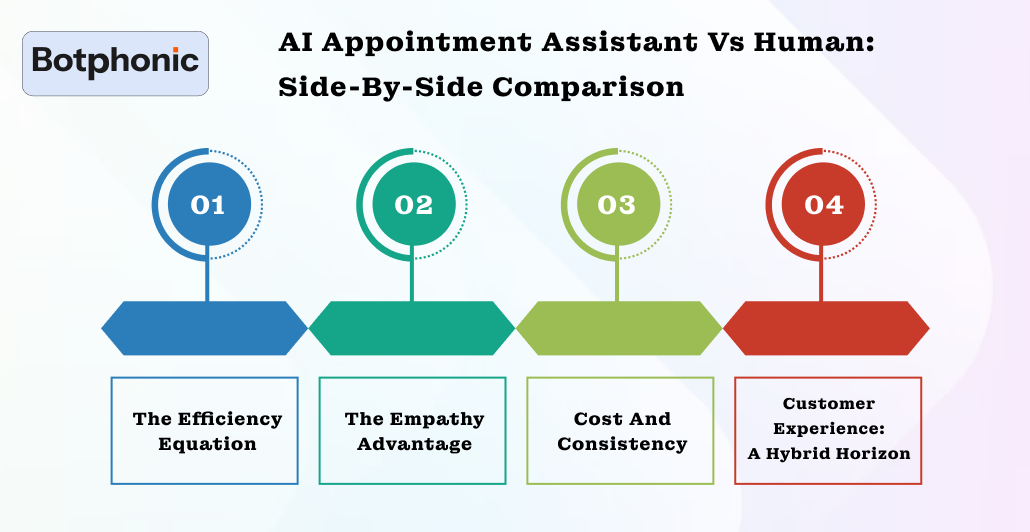
Let’s get honest with each other. The question is no longer just about AI and how businesses are booking appointments. The real question is who is doing it better. Is it an AI appointment assistant or a human scheduler?
For years, people had gotten accustomed to calendars and friendly voices, which guided them through the booking process. But AI appointment booking systems have entered and made it better with unmatched speed, accuracy, and 24/7 availability. It’s not just a theoretical comparison but has become a measurable one.
1. The Efficiency Equation
If it’s a discussion about speech and precision, an AI call assistant has already pulled ahead. It has been proven that an AI voice agent appointment booking system can manage hundreds of calls or messages at once, and confirm time in seconds, while updating the CRM data. There are no breaks, no hold music, and importantly, there are no “Can you call back in five minutes” moments in the business.
Meanwhile, even if you have the most capable human scheduler, they can only manage one customer at a time. It might be efficient, but with limitations.
And the final verdict of this is that AI is offering raw productivity and responsiveness.
2. The Empathy Advantage
This is the part where humans are shining like the brightest star in the sky. It’s their empathy and nuance that make them shine brighter. A human receptionist can easily detect tone, frustration, or uncertainty, which helps them adapt to the situation in real-time. They can smoothly take over a scheduling error with humor and offer reassurance while upselling without sounding robotic and scripted.
Even though AI is still improving, it struggles with emotional context. It might sound polite, but it can never feel it, at least not yet. The missing layer of genuine human warmth remains a competitive differentiator in high-touch industries like healthcare, luxury services, and hospitality.
When it’s about emotions or trust-building, humans are going to ace it.
3. Cost and Consistency
Now that we have ready theory, let’s check out the numbers. Because whatever the strategy is, it does cost economically.
Human schedulers cost more over time and require constant management. Whereas an AI appointment booking agent operates with consistency, accuracy, zero downtime, and predictable cost structures. Once it’s implemented, there’s zero scaling fee.
While turnover can wreak havoc in a human scheduling team, an AI virtual receptionist appointment booking platform will never fall sick, quit, or forget the details.
Now, even in terms of operational consistency and cost efficiency, AI is taking the lead and helping businesses grow.
You might be missing some major opportunities due to missed calls, forget these days, and try an appointment booking AI today, and scale effortlessly.
Try Demo Today!!!4. Customer Experience: A Hybrid Horizon
Let’s check out the major reveal, it’s not AI vs human, but has become AI with human. The business’s approach is to combine the strengths of both and make it more efficient than ever.
- AI can handle high-volume calls and low-emotion tasks.
- Whereas humans can step in when the conversation requires persuasion and empathy.
This hybrid appointment booking model is delivering the best of both. And it’s no longer about replacing people but elevating them to concentrate on value-driven interactions.
| Metric | AI Appointment Assistant | Human Scheduler / Traditional System |
| Conversion Rate (Lead → Appointment) | ~ 30-40% higher booking success when using AI setters vs manual callers under hybrid models. | Baseline human-only conversion lower—often ~ 20-35% depending on experience |
| Appointment Booking Rate (AI vs Human) | AI-powered scheduling systems book 3× more appointments than human-operated systems in some settings. | Human-run booking rates much lower in those same comparisons |
| New Patient / New Appointment Conversion in Healthcare | AI phone agents: ~ 50.9% conversion in one case. | Human schedulers in the same study converted ~ 52% of new patient calls. |
| No-Show / Missed Call Reduction | AI reduces missed calls and no-shows; sometimes 15-20% more appointments captured after hours; no-show reduction ~ 27-40% with reminders | Traditional systems miss 11% of calls during business hours in healthcare settings; more no-shows when reminders etc., aren’t automated |
| Response Time / Availability | Instant or seconds; 24/7 service; some AI systems answer within 2-3 rings or under 30 seconds; ~ 40% increase in after-hours leads captured | Human response time slower (minutes to hours); limited to business hours; after-hours calls often go unanswered. |
| Accuracy & Scheduling Errors | AI systems report ~ 95-99% accuracy in basic scheduling; fewer conflicts and human-error mistakes. | Human schedulers have somewhat lower accuracy (e.g., 85-95%), more errors from manual entry, fatigue, etc. |
| Cost Efficiency | AI reduces cost per appointment; for many healthcare or service-business contexts, cost per appointment drops by ~ 40-60% vs human-only systems. | Human-only operations incur higher labor, training, and overhead; the cost per appointment is higher. |
The Hybrid Future: AI + Human Collaboration
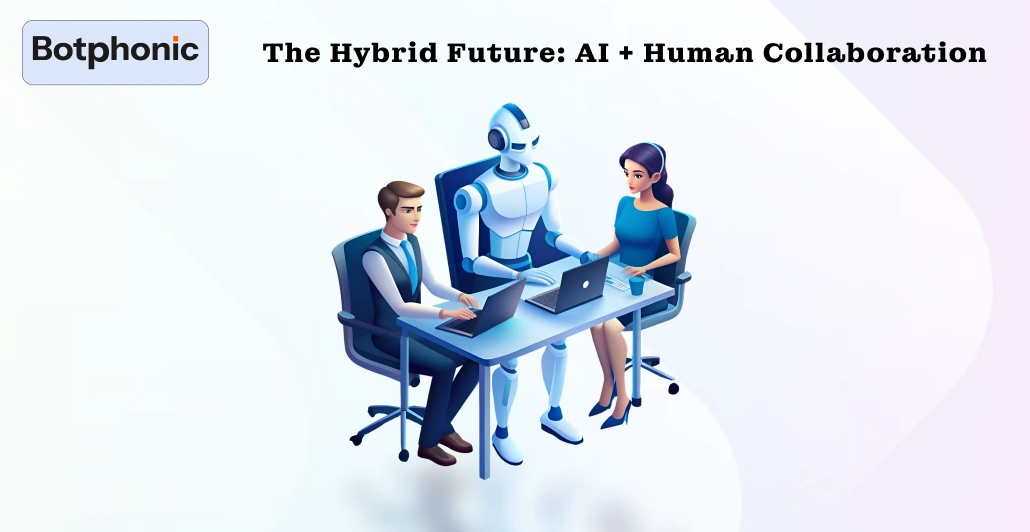
The future of appointment scheduling is no longer about man or machine, but it has become man and machine, who are working in harmony. While we already represented our points as a debate framed for AI appointment assistants vs humans, reality has proven far more intricate. The smartest businesses aren’t just replacing people with AI, but they are amplifying people through AI.
Why Does the Hybrid Model Work?
To explain it simply, let’s just say economics and psychology are combined here. AI brings speed and consistency to the table, whereas humans bring empathy, flexibility, and emotional intelligence. Together, they are covering the spectrum of the customers’ expectations in 2025.
Let’s check out their working model, which many leading organizations are adopting:
1. AI Handles the Routine Task
Tasks that can be done through automation are better suited for automated appointment booking AI systems. For instance, scheduling, rescheduling, confirmations, and reminders as well. These systems are designed to manage thousands of interactions at once, whether it’s in multiple languages or across different channels.
2. Humans Manage the Exceptions
When there are unique needs, special requests, or emotionally charged concerns, a human agent is preferred to handle the case. They can easily handle edge cases, complaints, and VIP experiences that require more nuance and care.
With this hybrid approach, it delivers both efficiency and empathy, creating a customer experience that feels personal and seamless.
Conclusion
In this blog, we hope you got your answer. It’s no longer about an AI appointment assistant vs a human scheduler. It has developed into an AI appointment with a human scheduler, and it’s making it work. A hybrid model has become a favorable approach for all businesses. It helps by allowing AI scheduling to automate repetitive tasks and allowing humans to focus on work that really matters.
Even recent studies have shown that AI appointment helps 30-40% higher booking success. When compared to human receptionists, it was shown that human responses were limited to business hours and varied due to emotions and situations.
